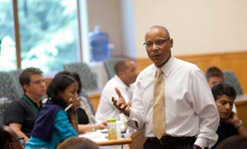Networks as Covers: Evidence from Business and Social On-line Networks
Topics: Infrastructure Process Management Social Talent & Workforce
 Seminars and Conferences
Seminars and Conferences
Technology, Innovation, and Learning (TIL)
• Tuck Campus • Hanover, NH • USA
May 18, 2011
Professor Piskorski received his B.A and M.A. (Cantab) from University of Cambridge where he read Economics and Politics at Christ’s College. Subsequently, he received A.M. in Sociology and Ph.D. in Organizational Behavior from Harvard University. After completing his Ph.D. Professor Piskorski became a faculty member in the Organizational Behavior area at the Graduate School of Business at Stanford University. In 2004, he returned to Harvard to teach the Required Curriculum Strategy course in the MBA Program. He is now teaching his own Elective Curriculum class: Competing With Social Networks. In addition, Professor Piskorski teaches in Building and Sustaining Competitive Advantage, Strategic Agility and Media Strategies Executive Education programs as well as in a number of external programs. Professor Piskorski is also Managing Director at Market Platform Dynamics where he consults extensively to large corporations in the financial services industry.
ABSTRACT
This paper proposes that networks can act as covers which allow actors to participate in markets while maintaining a plausible excuse that they are not. Such covers are most valuable to actors in long-term relationships, as those who are already employed or in a long-term romantic relationship should not be seen as participating in the market for a new relationship. Data in support of this view are provided on the basis of fieldwork and large dataset from a social on-line network with a global presence. Results show that men in relationships and with large on-line networks are more like to look at women they do not know. In contrast, single men with large networks are more likely to look at women they do know. Implications for network theories as they pertain to organizations are explored.
Speaker’s Website







